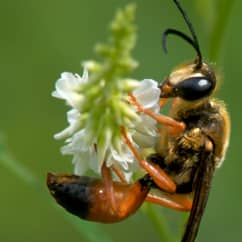
Overview of Digger Wasps
There are over 130 different species of digger wasps. This type of wasp will emerge during the summer months and are generally passive aggressive. They have large black bodies with yellow stripes on their rear end and an adult grows as big as one and a half inches long. Adults feed on flower nectar while their offspring feed on insects that are brought to them. Some commonly known types of digger wasps are the cicada killer, great golden digger and the mud daubers. Wasps are generally considered to be beneficial insects because they pollinate plants. Their nests should be left alone unless it is in the middle of a busy area and should only be addressed by a professional pest control technician.
Habits Of The Digger Wasp
Digger wasps are solitary wasps. They don’t need a whole colony to survive. They emerge in the spring and mate and then the females begin to dig tunnels in the ground to lay her eggs. They make little oval chambers off of their tunnels for the insect prey that they females hunt for and put there. When a female stings an insect the venom she injects paralyzes her prey. She then brings that victim to a chamber and lays an egg and leaves them there together. When the egg hatches, it will feed on the insect and then it makes a cocoon and hibernates over the winter. In the early summer months the new wasp comes out of its cocoon and tunnel to mate and start the life cycle all over again.
Threats Posed By Digger Wasps
Digger wasps do not pose a big threat to humans or their property. Only the females can sting. They will not sting humans unless they feel threatened. It is best to stay away from their nests but, they are not overly territorial if you do stumble upon one. Their nests may cause some damage in an area of dirt on your property because dig tunnels there for their nest.
Digger Wasp Prevention
To prevent digger wasps you would have to take away their ideal nesting location. They need dry dirt, good drainage, sunlight and plenty of insects to hunt. If you can eliminate these items from your property you will deter these digger wasps from your property.
Digger Wasp Control
If you find you already have a digger wasp nest on your property it is best to have a professional pest exterminator remove the nest. These wasps are not highly dangerous because they are solitary and passive aggressive, but you could identify their wasp nest incorrectly and put yourself and your family in danger. Here at Big Blue Bug Solutions, we have the tools, knowledge and experience to take care of your wasp problem, no matter what type. Contact us if you discover diggers wasps or other stinging insects on your property.


